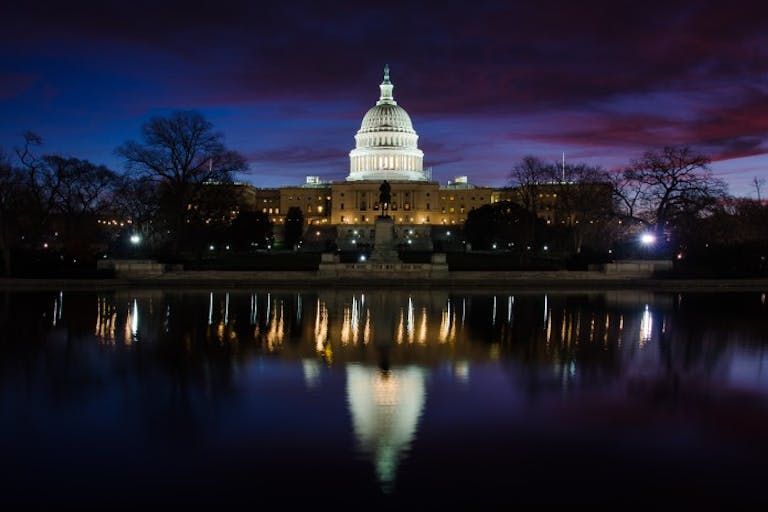
Full term 'miracle' baby born after 'unprecedented' ectopic pregnancy
Bridget Sielicki
·
Yes, Instapundit, the 20-week abortion ban is perfectly constitutional
Roe v. Wade’s centrality to the abortion debate gives most pro-lifers an acute awareness of how our Constitution is abused and ignored in modern-day America. And while that makes pro-lifers generally in sync with the broader conservative movement on constitutional fidelity, the near-century-long roots of this abuse have spawned a number of misconceptions that affect both sides.
Glenn Reynolds, University of Tennessee law professor and author of the popular blog Instapundit, claims in USA Today that Congress has no lawful power to enact the Pain-Capable Unborn Child Protection Act, and therefore those who voted for it violated their oath “to support limits on government even when those limits stand in the way of doing something they want to do”:
The problem is that Congress is supposed to exercise only the powers enumerated in the Constitution, and those powers don’t include regulating state medical procedures. (The federal government lacks even the power to criminalize murder as such: All federal “murder” statutes punish murdering someone in the course of violating some other federal law because unlike states, the federal government has no general “police power.”)
If you scroll through the powers enumerated to Congress in Article I, Section 8 of the Constitution, you’ll find such things as establishing uniform rules of bankruptcy, raising and supporting armies and navies, and establishing post offices and post roads. What you won’t find is anything that supports congressional power to impose a time limit on abortion.
No, but you will find it in the 14th Amendment, which forbids any state from “depriv[ing] any person of life, liberty, or property, without due process of law” or “deny[ing] to any person within its jurisdiction the equal protection of the laws” (with “person” meaning “any human being,” not just citizens or freed slaves), and grants that “Congress shall have power to enforce, by appropriate legislation, the provisions of this article.” So while murder per se isn’t Congress’s business, discriminatory prohibition of it is. In other words, even if the Constitution doesn’t require a state to criminalize murder, it does require the states that do to equally apply that protection to everybody.
It is true that our Founding Fathers wanted to leave as much as possible to the states’ discretion, including nearly all of their internal affairs, to a degree that many would deem unthinkable today. Allowing drastic diversity on so much is how the Constitution enables hundreds of millions of people with vastly differing views and values to live in harmony under a single flag, but we still need unity on the most basic rights they declared independence to protect.
If I don’t like living under my state’s tax rates, business regulations, gun restrictions, drug laws, etc., and if I can’t persuade my fellow residents to change them, I can escape their effects by moving to a different state. But preborn babies can’t. They’re completely at the mercy of others—which is where the federal government must step in to ensure their unalienable rights to life, liberty, and the pursuit of happiness are secured.
The standard end run around this is to invoke the Commerce Clause, that is, Congress’ power to regulate commerce “among the several states.” But the performance of an abortion in a local clinic is commerce among the states only if you adopt an unjustifiably expansive reading of the Commerce Clause that supports near-unlimited government power, so the party of small government ought to be reluctant to do so. Some might labor under the misapprehension that the Supreme Court has already upheld Congress’ power to regulate abortion under the Commerce Clause. In fact, in Gonzales v. Carhart, as Justice Clarence Thomas noted, that question was not addressed by either the Supreme Court or any lower court.
Article continues below
Dear Reader,
Have you ever wanted to share the miracle of human development with little ones? Live Action is proud to present the "Baby Olivia" board book, which presents the content of Live Action's "Baby Olivia" fetal development video in a fun, new format. It's perfect for helping little minds understand the complex and beautiful process of human development in the womb.
Receive our brand new Baby Olivia board book when you give a one-time gift of $30 or more (or begin a new monthly gift of $15 or more).
It’s possible, of course, that the Supreme Court would uphold regulation of abortion under the clause. In the past, it has, absurdly, upheld federal commerce power to punish a farmer for growing too much wheat on his own land, to feed to his own family and livestock, on the ground that if he didn’t grow his own he would be forced to buy the wheat on the open market, which would drive up prices and thus affect interstate commerce. With the bar set that low — and with liberal abortion-rights justices being fans of broad government power, while conservative limited-government justices oppose abortion — there’s a good chance that the law would pass Supreme Court scrutiny, whether it really ought to or not.
It’s curious that Reynolds focuses almost exclusively on this argument while leaving the real source of Congress’s abortion authority unmentioned. He’s right that the Commerce Clause, which was meant only to keep trade among the states free and open, doesn’t give Congress any power over abortion…but that’s irrelevant, because the 14th Amendment does. Admittedly, past versions of the 20-week ban have explicitly claimed such authority under the Commerce Clause, which was wrong. The current version is more nuanced:
Congress has authority to extend protection to pain-capable unborn children under the Supreme Court’s Commerce Clause precedents and under the Constitution’s grants of powers to Congress under the Equal Protection, Due Process, and Enforcement Clauses of the Fourteenth Amendment.
Ben Domenech writes at The Federalist:
Note that [bill author Rep. Trent] Franks properly says “precedents” in reference to the Commerce Clause (i.e., not an originalist interpretation, but the current SCOTUS understanding) and that he relies on the 14th explicitly.
As an originalist, I would rather the bill not reference the Commerce Clause at all. But at least with this phrasing one can make the argument that it’s merely pointing out the rules pro-aborts themselves play by on every other issue, while only claiming the Constitution itself means what it really does mean.
The backlash against Big Government that began with the rise of the Tea Party movement in recent years has done wonders to renew interest in properly understanding the Constitution’s meaning and government’s limits, but one side effect of discovering new or forgotten principles, such as states’ rights, is that we sometimes apply them in overzealous or simplistic ways. As important as it may be to limit federal power, it’s not the highest good of our republic.
After the Civil War taught them that America could not survive as a nation that only half followed the Declaration of Independence, our forefathers amended the Constitution to give Congress the tools to prevent states from treating part of their populations like property. It’s time to use them again.
Live Action News is pro-life news and commentary from a pro-life perspective.
Contact editor@liveaction.org for questions, corrections, or if you are seeking permission to reprint any Live Action News content.
Guest Articles: To submit a guest article to Live Action News, email editor@liveaction.org with an attached Word document of 800-1000 words. Please also attach any photos relevant to your submission if applicable. If your submission is accepted for publication, you will be notified within three weeks. Guest articles are not compensated (see our Open License Agreement). Thank you for your interest in Live Action News!

Bridget Sielicki
·
Analysis
Angeline Tan
·
Analysis
Cassy Cooke
·
Politics
Madison Evans
·
Opinion
Nancy Flanders
·
Investigative
Carole Novielli
·
Guest Column
Calvin Freiburger
·
Abortion Pill Reversal
Calvin Freiburger
·
Guest Column
Calvin Freiburger
·
Abortion Pill Reversal
Calvin Freiburger
·
Activism
Calvin Freiburger
·